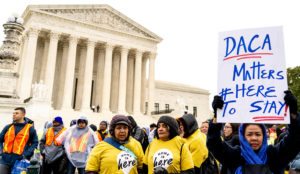#HomeIsHere
The weather was none too pleasant for attendees at Tuesday’s Supreme Court rally in support of the immigration policy known as DACA (Deferred Action for Childhood Arrivals). The rain hitting the faces of young and old alike mixed with salty tears as leaders from CASA (Court Appointed Special Advocates), Forward, and other organizations spoke words of hope and of resistance. Speakers detailed their journey with DACA and what its survival or demise, which the Supreme Court will decide, means to them. The Latinx community demonstrated how it earned its reputation as a resilient community, a community that will, regardless of the circumstance, make its presence felt and its voices heard. Even though all were terribly cold out there, the objective was to show up and show solidarity.
But the rally showed something far more meaningful. Empathy poured out from all walks of life. Brothers, sisters, and gender non-conforming folks of all races, Latinx, Indigenous, and Asian folk alike, revealed the many faces of DACA. Some stories were simple: parents who had come to seek better homes and refuge from the violence of their respective countries. Other stories involved mixed-status families who sheltered their illegal family members and are now all in danger of being forced out of the place they call home. I interviewed a member of the community, Jakelin Gonzalez-Sanchez, a DACA recipient who proudly held her graduation cap with the quote “Dreams without Borders” in lieu of a protest sign. The hat was beautifully detailed with gold letters and featured both her ethnicity and nationalism in embroidery.
In response to the question of what brought her to the rally, Gonzalez-Sanchez said she was there to represent those who currently rely on their DACA status, noting the program has brought her to where she is in life. “I am here to defend it and to stand up for it and the people who can’t make it today.”
I asked if she’d prefer the program remain as is or, if the Supreme Court strikes it down as unconstitutional, she thinks Barack Obama’s executive order could be improved upon if Congress has to go back to the drawing board. “We’ve been going through this process for many years,” she said. “But I’m optimistic, and I am hopeful about our legal system.”
Despite the outpouring of support on Tuesday in DC and around the country, fear is at an all-time high among the approximately 800,000 DACA recipients, many of whom are now adults with children, which further complicates the decision recipients will have to make if the program ends. Back in 2012, they were relieved when the Obama administration approved the policy through executive order after the DREAM Act failed to pass. DACA status must be renewed every two years to postpone the possibility of deportation and does not provide a path to citizenship (as the DREAM Act did) but does ensure those known as the “Dreamers” can get work permits. Many DACA recipients have attended college and made lives for themselves in the US.
Although anti-immigration sentiment is pervasive in the US and echoes rhetoric used by the current administration, a 2018 CBS News poll reported that 86 percent (roughly nine out of ten) of Americans favor letting Dreamers stay in the US. However, another poll by Statista released in February of this year shows only 64 percent of Democrats, 12 percent of Republicans and 26 percent of independent voters supporting DACA. Regardless of what the people favor or not, it is up to the Supreme Court to decide the fate of 800,000 people. If DACA ends, their lives will change forever and the basic things we take for granted will be taken away from them. If DACA ends, they will no longer be able to work legally, forcing them to seek “off the books” jobs that often are underpaid, and they risk the loss of privileges such as a driver’s license. A real concern is how the Department of Homeland Security will handle this. DACA recipients have submitted personal information submitted on their applications. Will we see it used to enact rapid deportations by ICE? For now, it is in the hands of the US Supreme Court. What will they decide?

